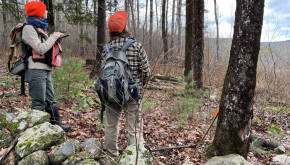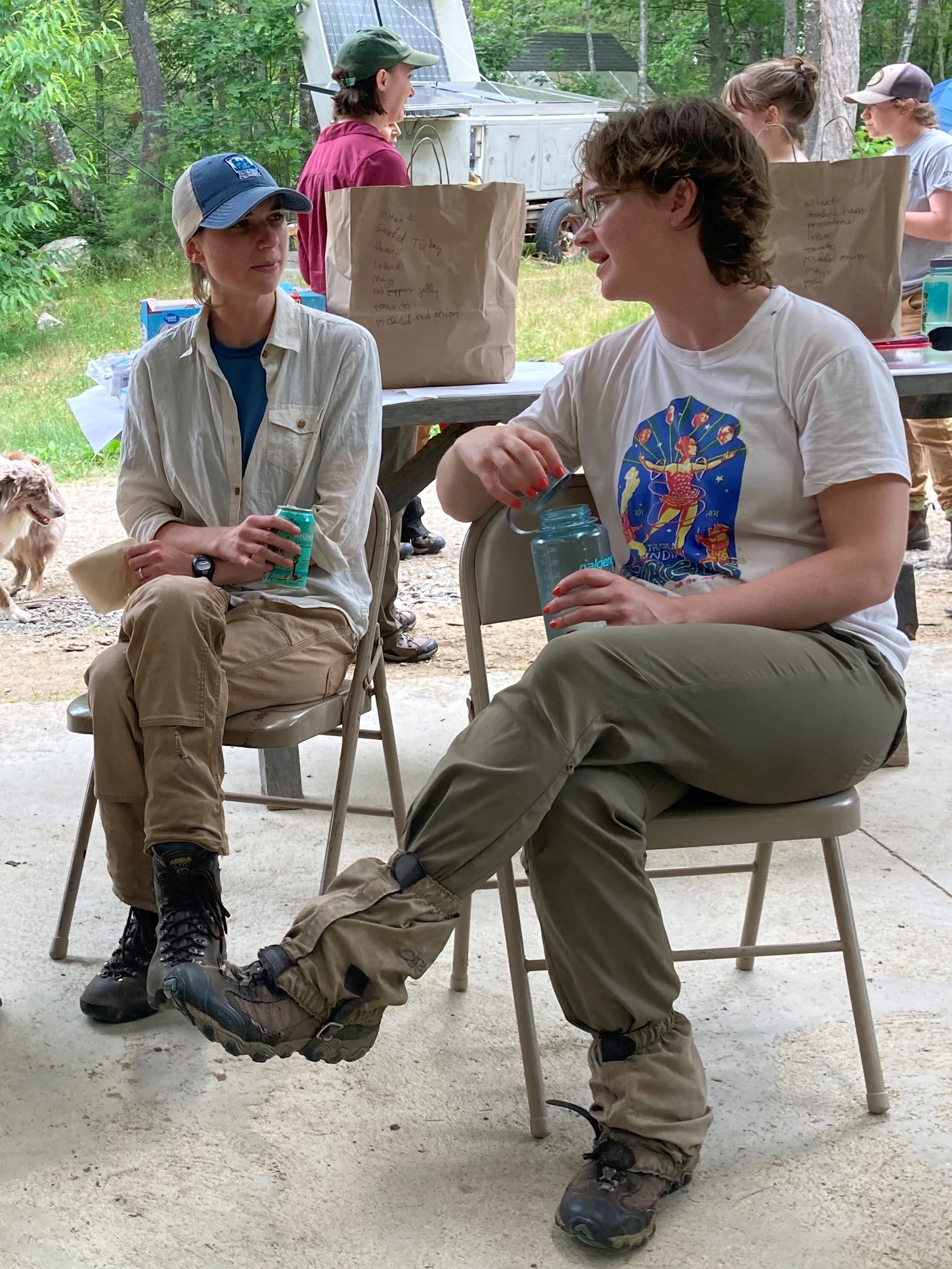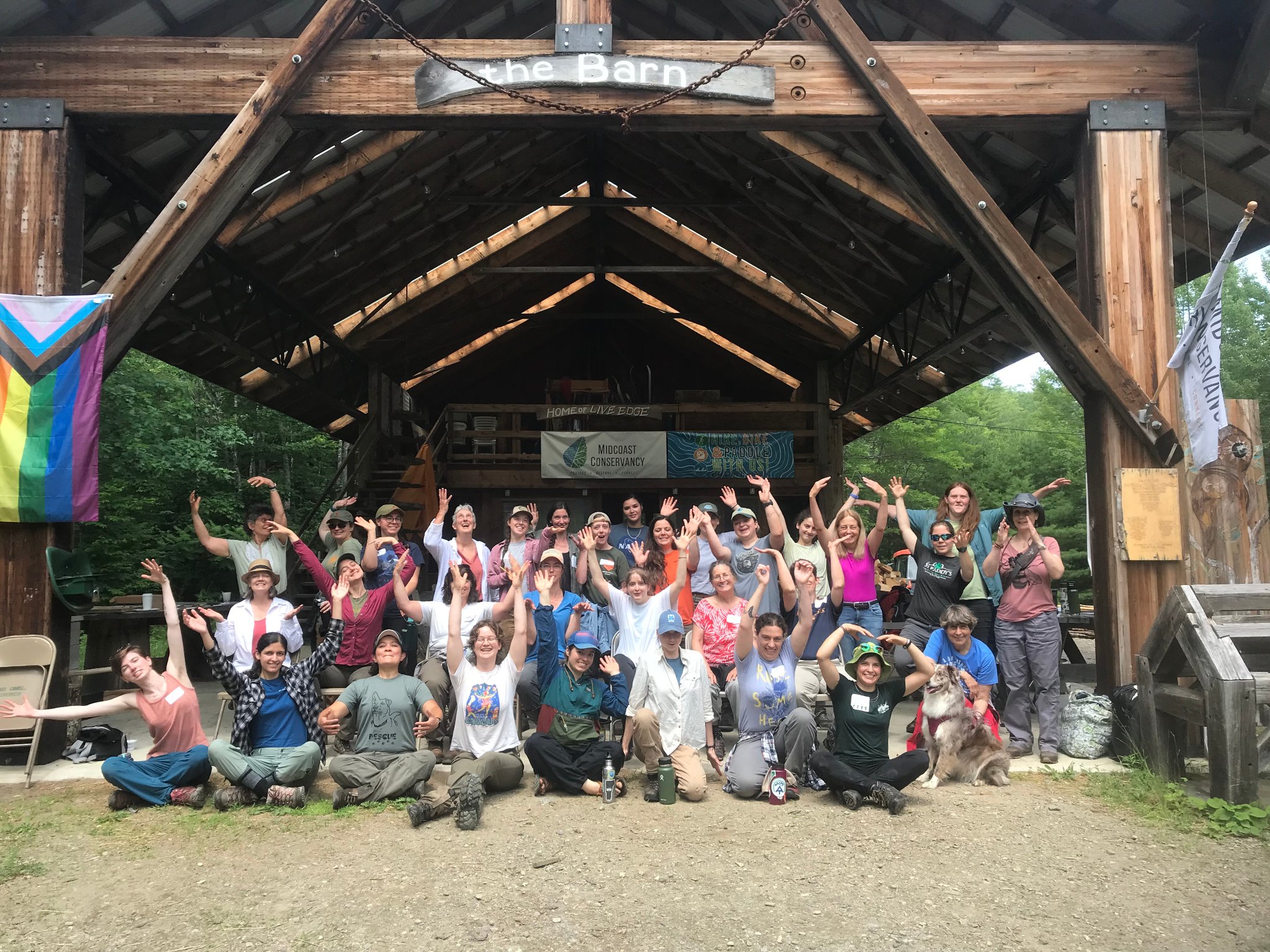
(Above photo shared by Tessa McGann) Hale, left, and Tessa discuss forestry in the field.
Written by Maddie Eberly, Forest Stewards Guild
Practicing forestry in Vermont and New Hampshire, Tessa McGann, forester in training, and Hale Morrell, consulting forester, work together at Long View Forest. Tessa and Hale’s work finds them working closely with landowners who typically own anywhere from 20 to 200 acres. These landowners are mostly families interested in managing their forests for recreation, timber, firewood, and wildlife, among other goals.
What is your day-to-day like?
Forestry work is seasonal and diverse. Both Tessa and Hale spend about half of their time in the office and half in the field. Most of the field work is forest inventory (measuring trees by size and species along with other measurements), but a large component of the work is meeting with landowners and providing education on forestry programs such as promoting good timber management or Natural Resources Conservation Service (NRCS) funding. Other field activities include going out to potential harvest sites with loggers along with preparing and laying out harvests. Landowners usually want to touch base prior to harvest; this means more walks in the woods. Office time is spent communicating with clients, writing management plans, or preparing for woods work.

discussing forestry and perhaps polar explorers.
What inspires you as a forester?
When Tessa initially began working as a forester, she loved working outside and with the land. Tessa previously studied geology, where human activities have little impact. As a forester, she now works at the intersection of land and people, working to create a healthy forest for both. She stated, in reflection, “This job is never boring.”
The balance between working lands and land managed for wildlife and recreation inspires Hale. Creating this balance is especially doable in New England where trees can be used locally, recreation and social use can be promoted, and there is a cultural importance for landowners to engage in supporting forest health.
What is the biggest challenge you think professional women in natural resources face?
Women often feel isolated, so it’s important to have space to talk about experiences as a woman. Tessa is a planning member for the Women Foresters Collaborative (WFC), a group building connections between women professionals and breaking down feelings of isolation. She notes, “we know representation matters so much - seeing something you identify with, seeing that reflected in your peers, in the people who are further along, and people doing things that inspire you in a field of your choice.” In addition to the support she gets from WFC, Tessa feels lucky to have found Lynn Levine and other women mentors.
Hale’s whole professional career has been in natural resources, and being a woman has not limited her. Instead, she found she was sometimes given a higher opportunity in the hiring process, as employers looked for women specifically. She expressed frustration at being interviewed based on her identity as a woman, rather than her many qualifications. This imbalance is a double-edged sword; while it is great to have more women in the field, it feels difficult to be interviewed based on something you can’t control, like your gender identity. Hale noted in her work with landowners there are many confident women, owning land as individuals and as families, engaged with land management.
What is your favorite memory from your career to date?
Tessa loves to spend time alone in the woods, which is often the case in forestry, but spending woods-time with other foresters, especially Hale, creates an opportunity to see, hear, and collaborate with others. Sharing woods-time with others reminds Tessa that foresters can still connect in deep and meaningful ways.
Hale participated in a weekly forestry meeting this past summer. A few foresters and a logger were standing in the rain, eating ice-cream and donuts for breakfast before heading out to look at big logging machinery and the logger’s work. Hale reminisced on the excitement and joy brought by a random summer day, working as a forester.

Women Forester's Collaborative meeting this past summer at Hidden Valley Nature
Center, connecting with women professionals and students in forestry.
What is your relationship as coworkers?
To Tessa, Hale is both a mentor and peer, more like an older sibling. Tessa can turn to Hale with questions, without fear of judgement. Older foresters, who have been at work for decades, can feel difficult to approach. Tessa was inspired to accept the position after speaking with Hale as a potential co-worker and seeing another woman happily employed at Long View Forest.
For Hale, she never felt like a mentor to Tessa because “Tessa does not need mentoring.” She is very inquisitive and knows how to ask questions while questioning the basis of things. Hale has learned so much from Tessa and felt very equal from the beginning. Hale describes Tessa as easy to goof around with, holding less worry of being judged.
What is your biggest attribute that has allowed you to be successful in your field?
Tessa loves to be around people. She enjoys working with others, learns from others’ strengths, and gives room for others to excel where they shine. Hale remarked on Tessa’s bright personality and willingness to “jump into it” and be part of a team. Skills can be learned, but the right personality can’t be taught.
Hale’s adaptability and willingness to try new things have helped her excel. For example, she didn’t start out as a “mapper” when first accepting her position but now Hale is a mapping expert. She likes to think creatively about mapping technology to increase job efficiency and safety.
What are you proud of? What inspires you?
Tessa is most proud when she questions her own instincts in forestry and the standard of thinking. She noted there is so much we don’t know about, so she tries to stay humble. She is inspired by those who are committed to a cause in a way that keeps them flexible and hopeful, continuously learning and changing.
Hale is proud of building trust with landowners, so they can communicate with her when they are unsure. She is proud when the landowners are excited for the next steps and see good things happen on the land. Polar explorers inspire Hale. The teamwork needed for a successful expedition makes her think of the team she works with, who know each other well enough to make one another smile at work. She is inspired by groups of curious, open-minded, and humble people learning together – a feeling she experiences at large gatherings of professionals.

